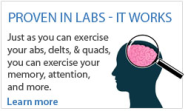-
About
- About Listly
- Community & Support
- Howto
- Chrome Extension
- Bookmarklet
- WordPress Plugin
- Listly Premium
- Privacy
- Terms
- DMCA Copyright
- © 2010-2025 Boomy Labs
 DynamicBrain Canada
DynamicBrain Canada
Listly by DynamicBrain Canada
How do you know when brain fitness exercises really work? A scientific design and smart science advisors are a great start, but they aren’t enough. To really know a brain exercise provides benefits to the brain, they must be tested in well-run clinical trials and merit inclusion in a “peer-reviewed” (reviewed by other people in the field for legitimacy) science journal. Our exercises and technologies have been directly tested in dozens of studies—with many more in progress.
Source: http://www.dynamicbrain.ca/peer-reviewed-research.html

A landmark study with dramatic results
With 524 participants, the IMPACT study is the largest clinical trial ever to examine whether a specially designed, widely available cognitive training program significantly improves cognitive abilities in adults. Led by distinguished scientists from Mayo Clinic and the University of Southern California, the IMPACT study proves that people can make statistically significant gains in memory and processing speed if they do the right kind of scientifically designed cognitive exercises.
The study was conducted on the original Posit Science Brain Fitness Program, which contains six of the auditory exercises in BrainHQ: Sound Sweeps (previously called High or Low?), Fine Tuning (previously called Tell Us Apart), Memory Grid (previously called Match It!), Syllable Stacks (previously called Sound Replay), To-do List Training (previously called Listen and Do), and In the Know (previously called Story Teller). Study participants trained in these exercises for a total of approximately 40 hours.

ACTIVE: A pioneering study with groundbreaking results
With 2,832 participants, the ACTIVE Study is the largest study on cognitive training ever performed. Funded by the National Institutes of Health and led by researchers at the University of Alabama at Birmingham, the National Institute on Aging, the Indiana University School of Medicine, Penn State University, and others, the ACTIVE study proves that healthy older adults can make significant cognitive improvements with appropriate cognitive training and practice. It also demonstrates that Posit Science training drives improvements that are significantly better than other types of cognitive exercise.

First Study to Show Brain Training Outperforms Crossword Puzzles
Led by principal investigator Dr. Fred Wolinsky from the Department of Health Management and Policy at the University of Iowa, the NIH-funded IHAMS was designed to overcome the limitations of the ACTIVE study (whose participants were all age 65 or older) by including younger participants (ages 50 or older). The 681 IHAMS participants were randomized into four groups: the first received 10 hours of onsite brain training with a Posit Science exercise that improves speed of processing and useful field of view (called Double Decision in BrainHQ). The second group did the same, but also had 4 hours of ‘booster’ training after 11 months. The third group engaged in 10 hours of crossword puzzle activity in a monitored clinical setting. The fourth group took the brain training software home to use on their own PC at their leisure. All groups were assessed prior to the start of the study, at 6 to 8 weeks into the study, and then at 12 months.

The many studies conducted on the exercise technologies in BrainHQ collectively show that they improve auditory memory, visual memory, ability to perform everyday tasks, driving safety, processing speed, health-related quality of life, and much more.
